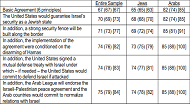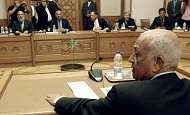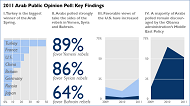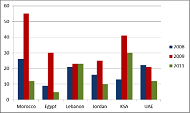PUBLIC OPINION, ARAB ISRAELI PEACE
Palestinian Public are Tactical Moderates, But Strategic Militants: Where Does that lead?

David Pollock / Fikra Forum, The Washington Institute (June 15, 2017)
Pollock analyzes a survey that shows the Palestinian public is more moderate than its leaders on short-term issues - such as PA funding for terrorists, a U.S. embassy move to Jerusalem, or Hamas attacks on Israel - but more conservative on the existential, narrative issues. Read More >
Poll Shows Most Palestinians for Practical Progress, Tactical Compromises with Israel

David Pollock / Fikra Forum, The Washington Institute (July 23, 2015)
Poll shows that most Palestinians want a ceasefire and economic cooperation with Israel, and that many would compromise on core issues to end the occupation. Read More >
Positions of the Israeli Public Regarding a Possible Peace Agreement

Palestinian Center for Policy and Survey Research (January - June, 2003)
Contains findings of two polls: "Positions of the Israeli Public Regarding a Possible Peace Agreement" by Machon Dahaf, and "Public Poll Findings on Peace with the Palestinians." The polls demonstrate that roughly two-thirds of respondents (67%) support a two-state solution based on the 1967 borders, with land swaps; a demilitarized Palestine; and Jerusalem's Old City administered jointly by the United States, Israel, and the Palestinians, with Israel maintaining control of the Western Wall. Read More >
Most Israelis Back Arab Peace Initiative

Israeli Peace Initiative / Al-Monitor (2013)
Includes results of a poll showing that 55% of the Israelis interviewed would support the Arab Peace Initiative to at least some degree. Only 27% ''strongly oppose'' the initiative, while 17.5% of them answered ''don't know". Read More >
The 2011 Arab Public Opinion Poll

Shibley Telhami / The Brookings Institution (November 2011)
Survey of 3,000 people in Egypt, Morocco, Jordan, Lebanon, and the United Arab Emirates in October 2011, assessing attitudes toward the United States and the Obama administration, prospects for Arab-Israeli peace, the impact of the Arab awakening, the outlook for the Egyptian elections, and opinions on where the region is headed politically. Read More >
Arab Attitudes: 2011

Zogby International / Arab American Institute Foundation (July 2011)
Finds that President Obama is seen overwhelmingly as failing to meet the expectations of Arabs set during his 2009 Cairo speech speech, and the vast majority of those surveyed disagree with U.S policies. In five out of the six countries surveyed, the U.S. was viewed less favorably than Turkey, China, France--or Iran. The countries surveyed viewed "U.S. interference in the Arab world" as the greatest obstacle to peace and stability in the Middle East, second only to the continued Palestinian occupation. Read More >
Does the Palestinian-Israeli Conflict Still Matter?

Shibley Telhami / The Brookings Institution (June 2008)
Analysis of some of the emerging trends in public attitudes and whether there has been a change over time in the degree to which Arabs assign importance to this issue. Also analyzes Arab public attitudes toward Israel, Israeli power, and the prospect of Middle East peace. PDF >